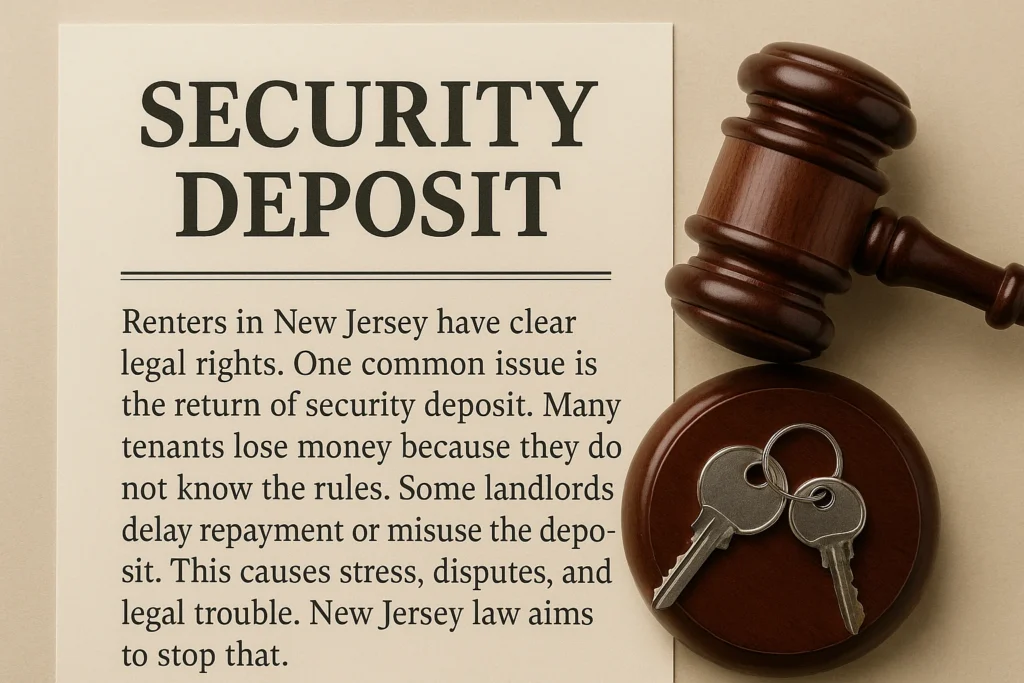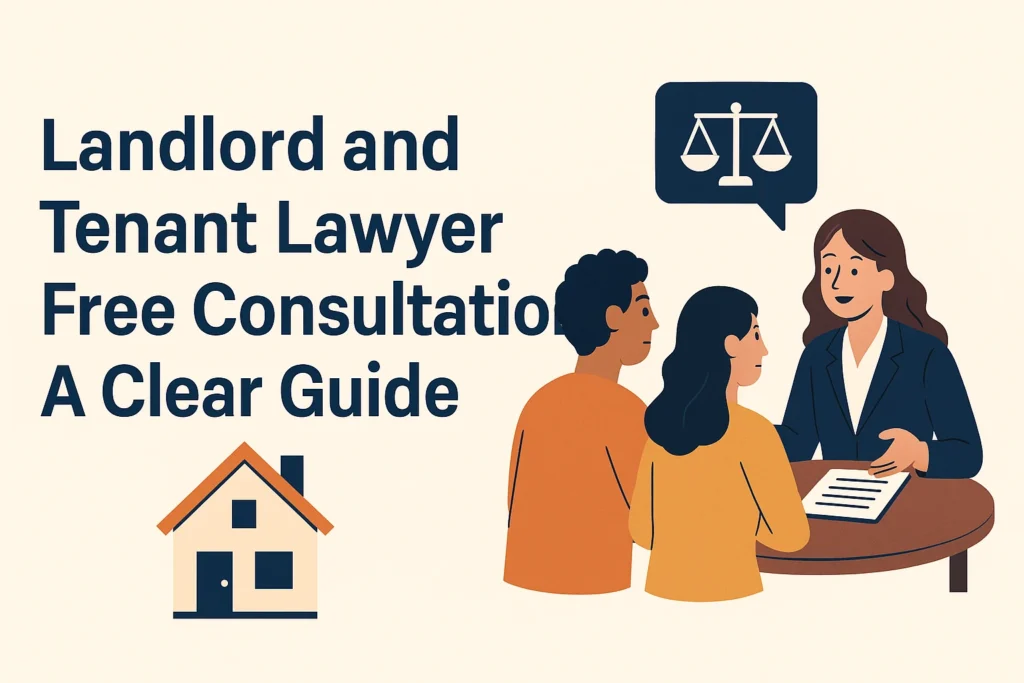Rental life in the U.S. runs on rules. Leases set terms. Courts enforce rights. Most months pass without trouble. Then a missed rent or a repair dispute turns calm into stress. A fast, clear plan helps you protect your home or your property.
An attorney for landlord-tenant laws steps in when risk grows. This lawyer knows state codes, city rules, and court steps. Good advice can end a dispute early. Strong advocacy can win a case when talks fail.
This guide explains the role of a landlord-tenant attorney in plain U.S. terms. You will see when a tenant should call one. You will see when a landlord should call one. And you will also learn about leases, deposits, habitability, notices, court steps, fees, and smart ways to choose counsel. Each section uses simple language so any reader can follow each step.
What a Landlord-Tenant Attorney Does
Working with a landlord tenant lawyer ensures you have expert guidance through complex legal steps. The task may look simple at first. It rarely is. Small errors sink cases. Missed dates kill claims. The attorney keeps each file on track and makes sure every step meets the law.
Advice is a major part of the job. A client brings facts. The attorney checks the lease, the notices, and the proof. Then the attorney explains options that fit the law in that state. A clear plan follows. That plan may involve a letter, a demand, a code complaint, or a case in court.
Court work is another core duty. The attorney drafts papers, serves notices, and argues in front of a judge. The attorney knows local rules and the pace in that venue. Proper service and tight proof often decide the outcome. A good attorney treats each detail as vital.
When Tenants Should Call an Attorney
Tenants face real harm when a landlord crosses legal lines. Lockouts happen in some cities. Utility shutoffs also occur. A landlord may block entry or remove doors. None of that is legal in most states. An attorney can stop it fast and seek damages if the facts allow.
Money issues also trigger legal needs. A landlord may keep a deposit with no valid reason. A tenant may lose pay due to mold or heat loss. A stove may fail and stay unfixed. Each fact pattern has a legal path. An attorney can press for repairs, a rent abatement, or a safe move-out.
Lease traps also harm tenants. Hidden add-ons show up at renewal. Illegal fees appear on ledgers. A vague clause opens the door to abuse. An attorney can review the lease, flag illegal parts, and push for a fair rewrite or a clean exit. Tenants gain power when the law sits on their side and proof supports the claim.
When Landlords Should Call an Attorney
Landlords face risk when rules feel unclear. A tenant may stop rent and refuse to leave. A notice may miss a key line. A service attempt may fail. A case that looks easy then fails in court. An attorney prevents those errors and keeps the process legal from start to end.
Property value also needs legal care. A strong lease guards the asset. Clear late fees, pet rules, and entry rights avoid fights later. State law caps some fees and sets strict entry rules. An attorney drafts terms that courts will respect. That reduces disputes and protects net income.
Risk also comes from bias claims and code claims. A word in an ad can spark a complaint. A slow fix can lead to fines. A fair process and good records help a lot. An attorney can audit forms, train staff, and set a plan that meets federal and state rules. Good prep lowers risk in each new lease.
Leases: Terms That Courts Respect
A lease is a contract. Each word has weight. A short, clear lease helps both sides. It sets rent, due dates, late rules, repair steps, and entry rights. Courts favor clarity over vague lines. An attorney writes terms that match state law and fit the property’s real needs.
Renewal terms also matter. Some states need new notices each term. Others allow auto renewals. A renewal clause that conflicts with state law can fail. An attorney aligns dates, notice rules, and rent steps so the lease holds up if a dispute goes to court.
Addenda can help or harm. A pet addendum may cap damage. A smoke addendum may ban smoke in hallways. Fee addenda that break state caps can fail. An attorney checks each addendum and removes traps that later cost money in court.
Security Deposits: Caps, Trust, and Return
States set caps on deposits. Many states use a cap of one or two months of rent. Some cities add local limits. Extra fees may count toward the same cap. A label like “key fee” or “pet fee” may not change the total. An attorney can flag totals that break the cap and demand a fix.
Trust rules also apply. Many states require a separate account. Interest rules vary. Some states need annual interest to the tenant. Others do not. A notice that shows bank name and account type may be due within a set time. An attorney will press for proof and use the lack of proof in court if needed.

Return rules are strict. States set a clear deadline after move-out. Deductions must be itemized. Receipts help prove costs. Normal wear is not on the tenant. Stains, holes, or broken parts may be valid costs. An attorney can demand full payment when the landlord fails the statute. Courts often award extra damages in clear cases.
Habitability, Repairs, and Access
Heat must work in cold months as set by local code. Hot water must run. Doors and locks must secure the unit. Leaks and mold must not exist. A landlord who ignores such issues may owe money or may face orders to fix them fast.
Tenants must report issues in writing. Photos and video help. A code complaint may also help. A landlord must get access to fix issues, but only on fair notice and at fair hours. A surprise entry can violate the law. An attorney can set a proper schedule that allows repairs and protects privacy.
A tenant who faces major defects may have legal routes to reduce rent, end a lease, or seek damages. A landlord who fixes issues fast can cut risk and keep good tenants. Clear records on both sides help resolve facts when a case reaches a judge.
Eviction: Notices, Service, and Court
Eviction is a legal process. A valid ground must exist under that state’s law. Nonpayment is the most common ground. Other grounds can include major damage, illegal acts, or major lease breaches. Each ground needs its own type of notice. Each notice has strict words and dates.
Service must follow local rules. Hand service often works. Mail plus a posting may be allowed in some states. Bad service can sink a case. Courts check this step first. An attorney knows local rules and ensures that the tenant receives proper notice under the statute.
Court comes next if the tenant does not cure or leave. The judge will check the lease, the notices, the ledger, and proof of service. A default may be entered if the tenant fails to appear. A warrant may follow. A landlord who wins still must use an officer. Self-help is illegal in most states. An attorney guides each step so no error delays relief.
Evidence and Records That Win Cases
Proof wins. Memory helps no one in court. Good files decide cases. Save the lease, all addenda, and every notice. Keep ledgers with dates and amounts. Keep emails and texts in one folder. Back up photos and video from move-in and move-out. Each file tells a clean story to a judge.
Tenants should keep repair requests, code reports, and reply dates. Photos of leaks, mold, pests, or broken locks carry weight. A short summary page that lists dates helps a lot. Judges like clear timelines. Short, direct facts help a claim move fast.
Landlords should keep work orders, vendor invoices, and proof of entry notices. Take photos after each repair. Use date stamps. Keep a clean rent ledger and bank proof that matches the ledger. Courts do not guess. They read. Strong records reduce doubt and support fair outcomes.
Costs and Attorney Fees
Legal costs vary across the U.S. A small town may have lower rates. A large city may have higher rates. Simple matters may use flat fees. Complex cases often use hourly bills. Some deposit or rent claims may use a fee shift statute. In those cases, the loser may pay the winner’s legal fees if the law allows it.
Ask about the scope before you sign. Clarify what a flat fee covers. Clarify court costs and service costs. Ask how often you will get updates and bills. A clear fee letter avoids surprise and protects both sides of the deal. Good firms welcome such questions and answer in plain terms.
Cost control also comes from good prep. Clients who bring clean files save time. Clients who reply fast keep momentum. Fewer court dates also cut costs. A lawyer can often end a case early through a demand or a fair deal that both sides can accept.
How to Choose the Right Attorney
Pick a local skill. Landlord-tenant law is state-specific. City rules also matter. A lawyer who knows that the courthouse has an edge. Ask about recent cases in your county. Ask about results and common hurdles in that venue. Real examples show real skill.
Check focus. Many lawyers claim broad skill. You need depth in rental law. Ask about lease work, deposit fights, habitability claims, and eviction defense or prosecution. Ask how the lawyer handles proof and service. Clear answers show real command.
Judge fit. A good attorney listens, explains options, and sets real goals. No one can promise a win. Be wary of grand claims. You need honest odds and a plan that suits your facts, budget, and time frame. Trust grows when advice is clear and steady.
State and Local Differences Across the U.S.
Each state sets core rules on deposits, notices, and court pace. Some states move fast on nonpayment. Others allow more time to cure. Some states cap deposits at one month. Others allow more. Some cities add extra notice steps or require rent-registry forms. Know your map before a dispute begins.
Tenant rights also vary. Some states allow strong repair remedies. Others allow modest rent cuts. A few cities have rent rules that limit increases. Many do not. An attorney who knows local add-ons will guide you through each extra step that a city requires.
Access rules differ as well. Some states set set hours for entry. Others set only “reasonable” terms. Scripted rules are easy to follow. Vague rules demand care. In all cases, notice and respect go a long way. Local knowledge helps you avoid a clash that ends in court.
Alternatives to Court
Not every fight needs a judge. Some cases end after a demand that cites the statute and gives a short cure period. Many people want a clean break and a fair number. A fast refund or a fair payment plan can end a rent or deposit case without court dates.
Mediation offers a neutral guide who helps both sides talk. The session can occur at a legal aid office, a court center, or a private group. The cost is often low. Deals can cover move-out dates, partial refunds, or repair lists with firm dates. A signed deal can then be enforceable if drafted well.
Arbitration is less common in this field but can appear in a lease. It replaces a judge with a neutral who decides the case. The process can move fast, but appeal rights are narrow. An attorney can explain pros and cons based on the clause and your facts.
Practical Tips for Tenants
Read the lease from front to back. Ask about deposits, due dates, late fees, entry rights, and repair steps. Ask about local rules on heat, water, and locks. Keep copies of every page you sign. Save proof of each rent payment and each repair request.
Take photos on day one. Note each flaw on a checklist. Send the list to the landlord and keep a copy. Do the same at move-out. Clean the unit well and date your photos. These steps protect your deposit and cut off false claims.
Act fast when a major defect appears. Heat loss, no hot water, or a door that will not lock needs quick action. Put it in writing and save proof. If the landlord fails to fix, call the code and call an attorney. Delays raise risk and cost more later.
Practical Tips for Landlords
Use a clear lease that fits your state. Set rent, due dates, grace days, late fees that meet the cap, and entry rules that match the law. Use addenda for pets, smoke, and utilities. Keep forms current as state rules change.
Create a repair system that works. Track each request, assign a vendor, and confirm completion. Give fair notice before entry. Meet code deadlines for heat and hot water. A steady repair plan lowers risk and keeps good tenants longer.
Serve proper notices when a breach occurs. Use the right form and the right time frame. Prove service with a sworn note or a vendor proof. File in the right court if the tenant does not cure or leave. An attorney can review each step so the case does not fail on a minor error.
Conclusion
Rental law protects homes and property across the U.S. The rules feel strict because they must keep the balance fair. A landlord-tenant attorney knows those rules and knows the courts that enforce them. That skill turns doubt into a plan and a plan into results.
Tenants gain safety when they act early, keep proof, and know the limits on deposits and access. Landlords protect value when they use strong leases, fix fast, and follow notice rules to the letter. Each side does best when records stay clean and dates stay on time.
Legal help is not a last resort. It is a smart step the moment risk appears. A short consult may end the dispute. A strong court case may protect rights when talks fail. Clear steps, honest advice, and tight proof lead to fair outcomes that the law will uphold.
This article shares general information about U.S. landlord tenant laws. It is not legal advice. Consult a qualified attorney for help with your specific case.



